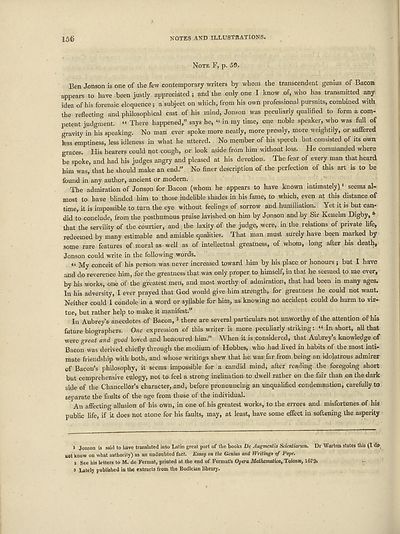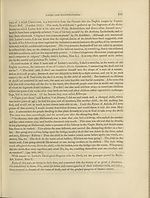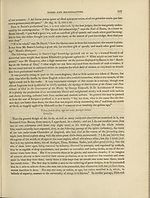Supplement to the fourth, fifth and sixth editions of the Encyclopaedia Britannica > Volume 1
(210) Page 156
Download files
Complete book:
Individual page:
Thumbnail gallery: Grid view | List view

156
NOTES AND ILLUSTRATIONS.
Note F, p. 59.
Ben Jonson is one of the few contemporary writers by whom the transcendent genius of Bacon
appears to have been justly appreciated; and the only one I know of, who has transmitted any
idea of his forensic eloquence; a subject on which, from his own professional pursuits, combined with
the reflecting and philosophical cast of his mind, Jonson was peculiarly qualified to form a com¬
petent judgment. “ There happened,” says he, “ in my time, one noble speaker, who was full of
gravity in his speaking. No man ever spoke more neatly, more pressly, more weightily, or suffered
less emptiness, less idleness in what he uttered. No member of his speech but consisted of its own
graces. His hearers could not cough, or look aside from him without loss. Fie commanded where
he spoke, and had his judges angry and pleased at his devotion. The fear of every man that heard
him was, that he should make an end.” No finer description of the perfection of this art is to be
found in any author, ancient or modern.
The admiration of Jonson for Bacon (whom he appears to have known intimately)1 * seems al¬
most to have blinded him to those indelible shades in his fame, to which, even at this distance of
time, it is impossible to turn the eye without feelings of sorrow and humiliation. Yet it is but can¬
did to conclude, from the posthumous praise lavished on him by Jonson and by Sir Kenelm Digby, *
that the servility of the courtier, and the laxity of the judge, were, in the relations of private life,
redeemed by many estimable and amiable qualities. That man must surely have been marked by
some rare features of moral as well as of intellectual greatness, of whom, long alter his death,
Jonson could write in the following words.
<t My conceit of his person was never increased toward him by his place or honours ; but I have
and do reverence him, for the greatness that was only proper to himself, in that he seemed to me ever,
by his works, one of the greatest men, and most worthy of admiration, that had been in many ages.
In his adversity, I ever prayed that God would give him strength, for greatness he could not want.
Neither could I condole in a word or syllable for him, as knowing no accident could do harm to vir¬
tue, but rather help to make it manifest.”
In Aubrey’s anecdotes of Bacon, 3 there are several particulars not unworthy of the attention of hia
future biographers. One expression of this writer is more peculiarly striking: “ In short, all that
were great and good loved and honoured him.” When it is considered, that Aubrey’s knowledge of
Bacon was derived chiefly through the medium of Hobbes, who had lived in habits of the most inti¬
mate friendship with both, and whose writings shew that he was far from being an idolatrous admirer
of Bacon’s philosophy, it seems impossible for a candid mind, after reading the foregoing short
but comprehensive eulogy, not to feel a strong inclination to dwell rather on the fair than on the dark
side of the Chancellor’s character, and, before pronouncing an unqualified condemnation, carefully to
separate the laults of the age from those of the individual.
An affecting allusion of his own, in one of his greatest works, to the errors and misfortunes of his
public life, if it does not atone for his faults, may, at least, have some effect in softening the asperity
l jonson is said to Lave translated into Latin great part of the books De Augmentis Scientiarum. Dr Warton states this (I dp
uot know on what aathority) as an undoubted fact. Essay on the Genius and Writings of Pope.
s See his letters to M. de Fermat, printed at the end of Fermat’s Operu Mathematicay Toloss, 1679.
3 Lately published in the extracts from the Bodleian library.
NOTES AND ILLUSTRATIONS.
Note F, p. 59.
Ben Jonson is one of the few contemporary writers by whom the transcendent genius of Bacon
appears to have been justly appreciated; and the only one I know of, who has transmitted any
idea of his forensic eloquence; a subject on which, from his own professional pursuits, combined with
the reflecting and philosophical cast of his mind, Jonson was peculiarly qualified to form a com¬
petent judgment. “ There happened,” says he, “ in my time, one noble speaker, who was full of
gravity in his speaking. No man ever spoke more neatly, more pressly, more weightily, or suffered
less emptiness, less idleness in what he uttered. No member of his speech but consisted of its own
graces. His hearers could not cough, or look aside from him without loss. Fie commanded where
he spoke, and had his judges angry and pleased at his devotion. The fear of every man that heard
him was, that he should make an end.” No finer description of the perfection of this art is to be
found in any author, ancient or modern.
The admiration of Jonson for Bacon (whom he appears to have known intimately)1 * seems al¬
most to have blinded him to those indelible shades in his fame, to which, even at this distance of
time, it is impossible to turn the eye without feelings of sorrow and humiliation. Yet it is but can¬
did to conclude, from the posthumous praise lavished on him by Jonson and by Sir Kenelm Digby, *
that the servility of the courtier, and the laxity of the judge, were, in the relations of private life,
redeemed by many estimable and amiable qualities. That man must surely have been marked by
some rare features of moral as well as of intellectual greatness, of whom, long alter his death,
Jonson could write in the following words.
<t My conceit of his person was never increased toward him by his place or honours ; but I have
and do reverence him, for the greatness that was only proper to himself, in that he seemed to me ever,
by his works, one of the greatest men, and most worthy of admiration, that had been in many ages.
In his adversity, I ever prayed that God would give him strength, for greatness he could not want.
Neither could I condole in a word or syllable for him, as knowing no accident could do harm to vir¬
tue, but rather help to make it manifest.”
In Aubrey’s anecdotes of Bacon, 3 there are several particulars not unworthy of the attention of hia
future biographers. One expression of this writer is more peculiarly striking: “ In short, all that
were great and good loved and honoured him.” When it is considered, that Aubrey’s knowledge of
Bacon was derived chiefly through the medium of Hobbes, who had lived in habits of the most inti¬
mate friendship with both, and whose writings shew that he was far from being an idolatrous admirer
of Bacon’s philosophy, it seems impossible for a candid mind, after reading the foregoing short
but comprehensive eulogy, not to feel a strong inclination to dwell rather on the fair than on the dark
side of the Chancellor’s character, and, before pronouncing an unqualified condemnation, carefully to
separate the laults of the age from those of the individual.
An affecting allusion of his own, in one of his greatest works, to the errors and misfortunes of his
public life, if it does not atone for his faults, may, at least, have some effect in softening the asperity
l jonson is said to Lave translated into Latin great part of the books De Augmentis Scientiarum. Dr Warton states this (I dp
uot know on what aathority) as an undoubted fact. Essay on the Genius and Writings of Pope.
s See his letters to M. de Fermat, printed at the end of Fermat’s Operu Mathematicay Toloss, 1679.
3 Lately published in the extracts from the Bodleian library.
Set display mode to:
![]() Universal Viewer |
Universal Viewer | ![]() Mirador |
Large image | Transcription
Mirador |
Large image | Transcription
Images and transcriptions on this page, including medium image downloads, may be used under the Creative Commons Attribution 4.0 International Licence unless otherwise stated. ![]()
| Encyclopaedia Britannica > Supplement to the fourth, fifth and sixth editions of the Encyclopaedia Britannica > Volume 1 > (210) Page 156 |
|---|
| Permanent URL | https://digital.nls.uk/193156867 |
|---|
| Attribution and copyright: |
|
|---|
| Description | Ten editions of 'Encyclopaedia Britannica', issued from 1768-1903, in 231 volumes. Originally issued in 100 weekly parts (3 volumes) between 1768 and 1771 by publishers: Colin Macfarquhar and Andrew Bell (Edinburgh); editor: William Smellie: engraver: Andrew Bell. Expanded editions in the 19th century featured more volumes and contributions from leading experts in their fields. Managed and published in Edinburgh up to the 9th edition (25 volumes, from 1875-1889); the 10th edition (1902-1903) re-issued the 9th edition, with 11 supplementary volumes. |
|---|---|
| Additional NLS resources: |
|

